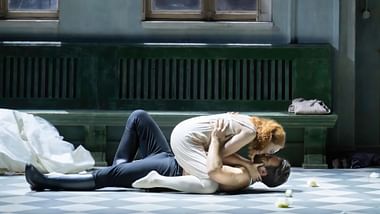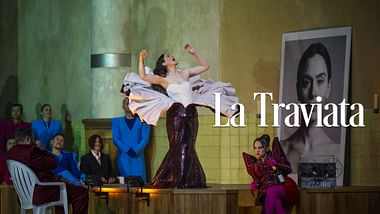- Watch
Gustave Charpentier: Louise
Festival d'Aix-en-Provence
- Watch
Jean-Philippe Rameau: Platée
Czech National Theatre, Prague
- Watch
Gaetano Donizetti: Maria Stuarda
Teatro Real, Madrid
- Watch
Giacomo Puccini: Madama Butterfly
Festival d'Aix-en-Provence 2024
- Watch
Gioachino Rossini: William Tell
Opéra de Lausanne
- WatchNext
A Christmas Carol
A Ballet based on Charles Dickens' Novella
- Watch
Alexander Rodin: Kateryna
A premiere by Odessa Opera
Gioachino Rossini: William Tell
Opéra de Lausanne202 min
Verfügbar bis zum 28/01/2026
Gessler’s hat became a metaphor for enforced submissive behaviour. When William Tell refuses to salute the tyrannical Governor’s hat, his punishment is to put his son’s life in danger. Rossini’s opera, based on Friedrich Schiller’s play, is performed in Lausanne for the first time. With Jean-Sébastien Bou in the title role and Luigi De Donato in that of the Governor.
On a bright summer’s day, the villagers are preparing a wedding feast. William Tell, however, can only think about the fact that the Habsburgs rule over the country and that the people are not free. He calls for an uprising. Leuthold, a shepherd, bursts into the middle of the celebration. He is being chased by the occupying forces because he had tried to protect his daughter, and asks for someone to take him to the other side of the lake. Although a storm is brewing, Tell is willing to risk it and brings Leuthold safely across the dangerously choppy water to the opposite shore. This is how Rossini’s story of the Swiss struggle for freedom begins.
Friedrich Schiller had already linked the founding myth of Switzerland with the figure of the marksman. The famous apple shot takes place during a feast in honour of the Habsburgs. The Swiss are mistreated by the soldiers and Gessler’s hat is displayed like a trophy before which the inhabitants must bow. Everyone bows – everyone except Tell. He is arrested but manages to tell his son Jemmy to send a signal to the three cantons to rise up. Gessler gives Tell the order to shoot at an apple placed on his child’s head. If he misses the target, both father and son will die. To the cheers of the Swiss, Tell passes the dreaded test. However, when he tells Gessler that the second arrow, which was hidden in his quiver, was intended for him if his son had been hit, the Governor has him arrested. When the Habsburg princess Mathilde arrives, Jemmy is freed from the Governor’s clutches, but Tell is taken away to be executed in Gessler’s fortress.
The crossing to the fortress ends badly for the soldiers and fatally for Gessler when the boat is caught up in a heavy storm. William Tell escapes, jumps onto the shore, draws his bow and shoots the Governor.
Princess Mathilde has fallen in love with Arnold von Melchtal, the future representative of the Canton of Unterwalden at Rütli. Torn between his beloved and the freedom fighters, he finally joins her on the side of the rebels and conquers the Governor’s castle. The victory is complete.
The staging for the Lausanne production is by Bruno Ravella, while Francesco Lanzillotta conducts the Orchestre de Chambre de Lausanne. The title role is sung by Jean-Sébastien Bou, his wife Hedwig by Géraldine Chauvet and his son Jemmy by Elisabeth Boudreault. Luigi De Donato plays the role of the evil governor. Two of the negotiators who would go on to found the Swiss Confederation on the Rütli Oath play a role in the opera: Arnold von Melchtal, interpreted by Julien Dran, and Walter Fürst, sung by Frédéric Caton.
Filmed on 11 and 13 october at the Opéra de Lausanne.
With
Jean-Sébastien Bou (William Tell)
Olga Kulchynska (Mathilde)
Julien Dran
Luigi De Donato
Elisabeth Boudreault
Géraldine Chauvet
Frédéric Caton
Sahy Ratia
Jean Miannay (Rodolphe )
Marc Scoffoni
Warren Kempf
Composer
Gioachino Rossini
Director
Bruno Ravella
Music director
Francesco Lanzillotta
Orchestra
Orchestre de Chambre de Lausanne
Choir director
Alessandro Zuppardo
Choir
Chœur de l'Opéra de Lausanne
Libretto
Victor-Joseph Étienne de Jouy, Hippolyte-Louis-Florent Bis
Country
France
Switzerland
Year
2024
You may also like
- Watch
Giuseppe Verdi: La Traviata
Grand Théâtre de Genève
- Watch
Astor Piazzolla's Maria de Buenos Aires
Grand Théâtre de Genève
- Watch
Mozart: Lausanne Chamber Orchestra
Ton Koopman and Julia Lezhneva
- Watch
Handel's Messiah
Lausanne Cathedral 2025
- Watch
Jean-Jacques and Alexandre Kantorow interpret Brahms
Concert with the Orchestre de Chambre de Lausanne
- Watch
Opera Gala
Hanover Klassik Open Air 2025
- Watch
ARTE Europe Weekly
Trump Wants Greenland: What Can Europe Do About It?
- Watch
“Adiós, alcohol!”
- Watch
Tribute to David Bowie
Heroes Never Die
The most viewed videos on ARTE
- Watch
ARTE Europe Weekly
Trump Wants Greenland: What Can Europe Do About It?
- Watch
“Adiós, alcohol!”
- Watch
Tribute to David Bowie
Heroes Never Die
- Watch
Re: A Viennese Cafe Against Solitude
- Watch
Disunited Nations
The UN and the Middle East
- Watch
ARTE Reportage
Venezuela: Maduro's Supporters FaceTrump
- Watch
Jane Austen
Literature and Passion
- Watch
ARTE Europe Weekly
What does adopting the euro mean for Bulgaria?
- Watch
Roya
Eurosonic Noorderslag 2026
- Watch
Joaquin: Concierto de Aranjuez
With Thibaut Garcia






















